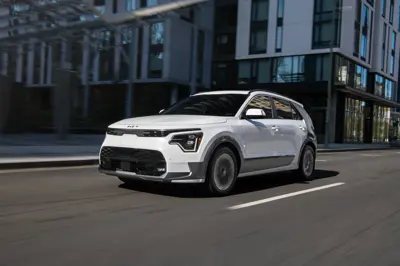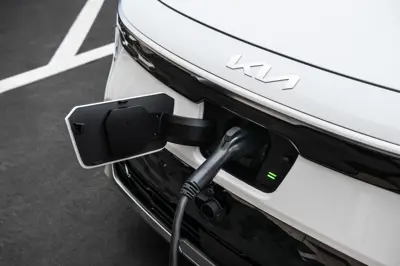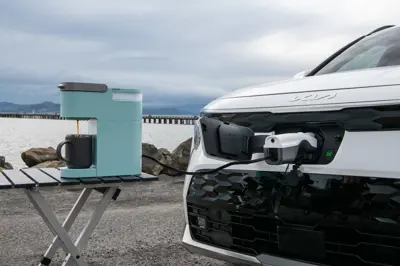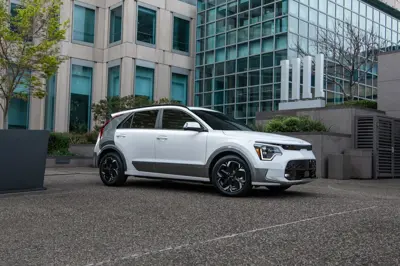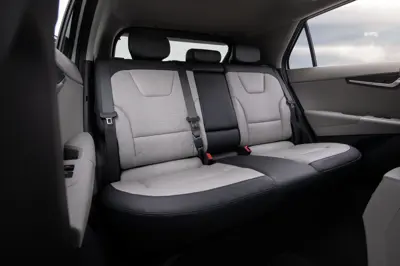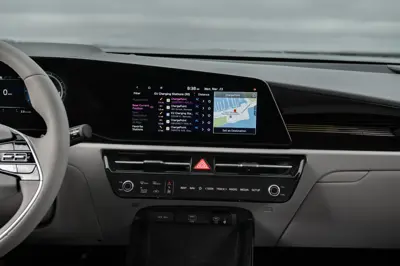Kia Niro EV

The Kia Niro EV is an all-electric crossover offering a WLTP range of up to 463 km (288 miles). EVKX.net has all the details you need.
Kia Niro EV
We've organized this article into specific sections for easier navigation. Click the links below to jump to different areas or read on for the full article. Additionally, we offer an overview of the full specifications, an image gallery, detailed information about charging performance, and some online reviews. Our sections include:
Performance
The Kia Niro EV offers modest performance with a maximum power of 150 kW (204 hp / 201 bhp) and a total torque of 255 Nm (188 lb-ft). It accelerates from 0 to 100 km/h (0 to 62 mph) in 7.8 seconds and has a top speed of 167 km/h (104 mph), aligning more closely with traditional internal combustion engine vehicles.
Kia Niro EV
Battery, Range, and Charging
The high-capacity battery has a gross capacity of 68.0 kWh and a net usable capacity of 64.8 kWh, providing a 3.2 kWh buffer (4.7%) for battery protection. With a nominal voltage of 358 volts, the system is classified as a 400-volt battery system, aligning with industry standards.
According to the WLTP (Worldwide Harmonized Light Vehicles Test Procedure) standard, the vehicle's range is 463 km (288 miles), with an energy consumption rate of 14.0 kWh/100 km (3 mi/kWh).
For more details about the range, see real-world data and range listings on this model’s range and consumption page.
The vehicle supports fast DC charging with a maximum power of 233 kW. Charging from 0% to 100% takes approximately 95 minutes, while a typical 10% to 80% charge takes about 45 minutes with an average charging speed of 60 kW.
Considering an additional 5 minutes for each charging stop due to driving interruptions, the optimal charging range is from 4% to 56%. This results in an effective charging speed, including time lost, of 59 kW, with each charging session taking about 34 minutes and 6 seconds.
In a 1000 km challenge at a constant speed of 120 km/h (75 mph) with an assumed consumption rate of 20 kWh/100 km, the trip would take about 10 hours and 38 minutes, needing five charging stops from 4% to 46%, totaling 138 minutes of charging time.
Onboard Charger
The standard onboard charger supports up to 11 kW for Level 1 and Level 2 AC charging, allowing a full 0–100% charge in about 5 hours and 53 minutes with a standard home setup.
Charge Port
The location of the charge port is on the front. This location makes it easy to use charge stations where you need to park with the front in.
Connector types vary by market: this model uses CCS Combo 1 in North America and CCS Combo 2 in Europe. For complete specifications for all markets, refer to the full specifications.
Kia Niro EV
Drivetrain
The Kia Niro EV has a rear-wheel drive system supported by one motor on the rear axle.
Suspension
en drivetrain.suspension.standard.frontconstruction_notset.rearconstruction_notset.frontdampers_monotube.reardampers_monotube.frontspring_coil.rearspring_coil
The suspension has a fixed height and damping characteristics.
Ground clearance with this setup is 160 mm.
Brakes
Regenerative Braking
Regenerative braking is available in two modes. You can use one-pedal driving or you can coast and use the blended brakes to regen.
The maximum regenerative power is 150 kW.
Exterior
The Kia Niro EV, with dimensions of 4420 mm in length, 1825 mm in width, and 1545 mm in height, falls into the B-SUV segment cars, also known as subcompact SUVs or crossovers, offer a combination of the compact size and maneuverability of B-segment cars with the higher driving position, increased cargo space, and rugged styling of an SUV.
You can choose between 11 different paint colors when ordering this model.
The Kia Niro EV offers multiple wheel options in different sizes, allowing you to customize your vehicle to suit your style and driving preferences. The available tire and wheel combinations include:
- 235/55 tires on 19" rims
- 255/45 tires on 20" rims
Narrower wheels improve consumption and provide a longer range, while wider wheels offer better traction and handling.
The car has four regular doors and a hatchback-style liftgate.
There are two different roof options to select from.
The standard is just a regular roof.
The standard roof has a sunroof. The glass extends over only the front row, and occupants can open it. This glass makes the car’s interior feel more spacious and bright, which can improve the mood and comfort of the occupant. It has an electric curtain that occupants can use to protect against the sun.
Additionally, you can order the car with tinted windows from the B-pillar backward, which enhances privacy and reduces glare and heat from the sun, making the interior more comfortable for passengers.
Kia Niro EV
Interior
There is one seat type you can select in different materials.
Seats
The Kia Niro EV accommodates five passengers with two front seats and a three-seat bench in the rear.
First Row Seats
The Kia Niro EV offers a single type of front seat.
The following functionalities are available on the **** seat:
- Fore-and-aft adjustment (electrically adjustable)
- Recline adjustment (electrically adjustable)
- Height adjustable headrest
- Heating
- Memory (standard for driver, not available for passenger)
- Adjustable lumbar support (electrically adjustable as an option)
- Ventilation (optional)
Second Row Seat
The second row features a standard three-seat bench with a 60:40 split, allowing each section to fold separately to increase cargo space.
Additional functionalities include:
- Recline adjustment (manually adjustable)
- Heating (standard for outer seats)
Kia Niro EV
Climate System
There is one climate system available:
- 2-zone climate system: Supports different temperatures for the driver and passenger.
This model has a heat pump as an option. This heat pump can save significant energy used for heating in cold weather.
Comfort Features
The Kia Niro EV includes several features to enhance comfort and convenience:
- Wireless Phone Charging
User Interface and Control
This model features a dual-screen setup integrated into a shared horizontal frame on the dashboard, clearly separating driver and infotainment functions while maintaining a unified visual design.
Key screen details:
- Driver Information Display: A 10.3-inch screen positioned behind the steering wheel on the left side of the shared dashboard frame. It provides essential driving data such as speed, range, and navigation prompts.
- Infotainment Screen: A 10.3-inch touchscreen located on the right side of the same shared frame. It serves as the main interface for infotainment, navigation, and vehicle settings.
A optional head-up display projects key driving information—such as speed and navigation cues—onto the windshield for enhanced safety and convenience.
Kia Niro EV
Steering Wheel
The Kia Niro EV is equipped with a single type of steering wheel:
- Circular Steering Wheel: This steering wheel features optional integrated heating for added comfort during cold weather. It also provides intuitive control over the infotainment system, allowing you to easily adjust the volume, change music tracks, and manage other key functions.
Mirrors
Both the exterior and interior mirrors use conventional mirror technology to provide a clear view of the area behind the vehicle.
Infotainment
Navigation System
With the common.standardfeature in-car navigation system, you have all the assistance you need to reach your destination effortlessly.
Phone Mirroring
The Kia Niro EV supports Android Auto and Apple CarPlay, allowing you to mirror your phone's screen on the car's display. This functionality enables you to run apps like Google Maps or Waze directly from your phone.
Sound System
You can choose between two sound systems for the Kia Niro EV:
- Standard: Features six speakers.
- Meridian Premium Sound System: Features en 14 speakers.
Additionally, the model includes 4 USB-C connections as standard.The model has 1 USB-A connections as standard.
Mobile App
The Kia Niro EV comes with a dedicated mobile app, available for both Android and iOS devices, allowing you to manage and monitor your vehicle remotely. The app offers a wide range of features designed to enhance your driving experience:
Lights
Standard Headlights: These use advanced LED technology, providing bright and efficient illumination.
The taillights use LED technology, ensuring both high visibility and energy efficiency.
Advanced Driver Assistance Systems
The Kia Niro EV features a range of standard and optional advanced driver assistance systems (ADAS) designed to enhance safety and comfort.
Safety Systems
Anti-lock Braking System (ABS): Standard on the Kia Niro EV, this system prevents the wheels from locking during braking.
Electronic Stability Control (ESC): Standard on the Kia Niro EV, this system improves the vehicle's stability and handling during sudden maneuvers or on slippery road conditions.
Lane-Keeping Assist (LKA): Standard on the Kia Niro EV, this system helps prevent the vehicle from drifting out of its lane.
It also includes a Lane Departure Warning system to alert the driver if the vehicle veers out of the lane.
Front Cross Traffic Assist (FCTA) : Standard on the Kia Niro EV, this driver assist system that helps drivers detect oncoming traffic when crossing an intersection or turning left or right from a stopped position.
Rear Cross Traffic Alert (RCTA): Standard on the Kia Niro EV, this system uses sensors to detect approaching vehicles from the side when backing out of a parking space or driveway.
Automatic Emergency Braking (AEB): Standard on the Kia Niro EV, this system autonomously applies the brakes to prevent or reduce the severity of a collision if the driver does not react in time.
Automatic Emergency Steering (AES): Standard on the Kia Niro EV, this system assists in avoiding collisions by automatically steering the vehicle in an emergency.
Blind-spot Monitoring (BSM) : Standard on the Kia Niro EV, this side assist system helps to detect traffic in blind spots.
Driving Automation
With the standard level 2 system, you get the following driving automation features.
- Adaptive Cruise Control (ACC)
- Lane Centering Assist (LCA) /AutoSteer: keeps the car in your lane and slows down if needed in traffic. The system limits how long you can drive without touching the steering wheel.
Safety
Security and Access Technologies
The Kia Niro EV is equipped with essential security features to protect you and your vehicle, offering simplicity and reliability. These include:
Cargo Capacity and Towing Ability
The trunk offers a cargo capacity of 475 liters (16.8 CU FT). With the rear seat folded down, this expands to 1392 liters (49.2 CU FT).
On the roof, you can load up to 75 kg (165.3 lbs).
Roof rails are standard for easy mounting of a roof box or rack.
Additionally, there is a frunk (front trunk) with a storage capacity of 20 liters (0.7 CU FT).
The vehicle’s maximum weight is 2200 kg (4850 lbs), with a base weight of 1682 kg (3708 lbs). This allows for a maximum load of 518 kg (1142 lbs), including the driver and passengers. Note that some options may increase the base weight and reduce the maximum loading capacity.
A towbar can be added to the vehicle. The maximum permissible weight for a braked trailer is 750 kg (1653 lbs), while for an unbraked trailer, it is 300 kg (661 lbs).

